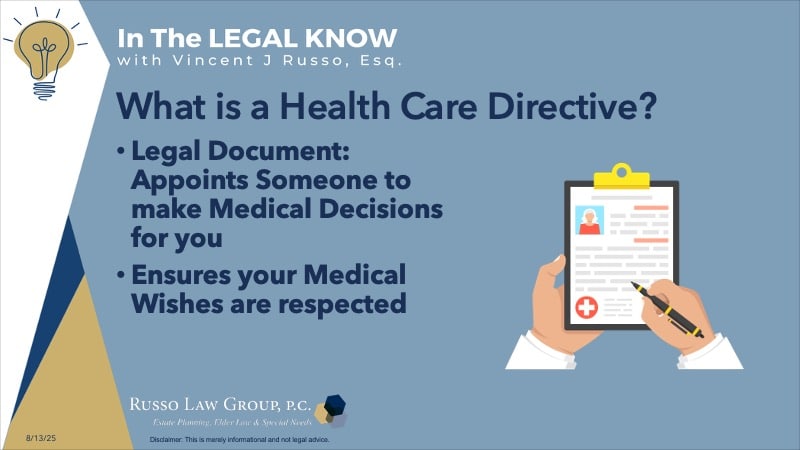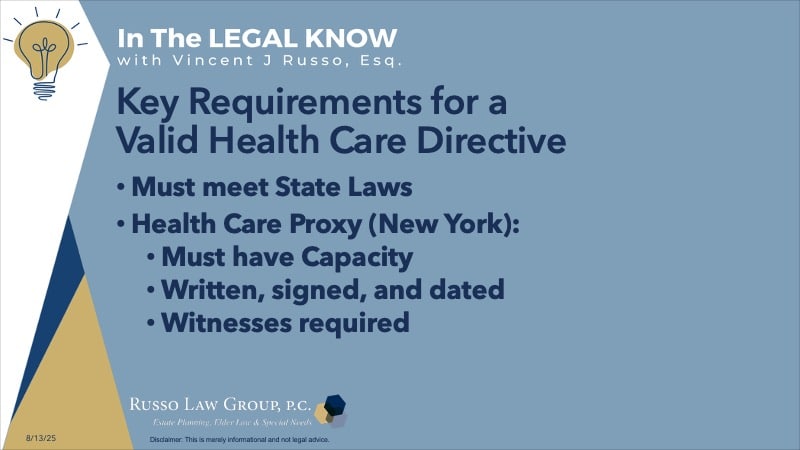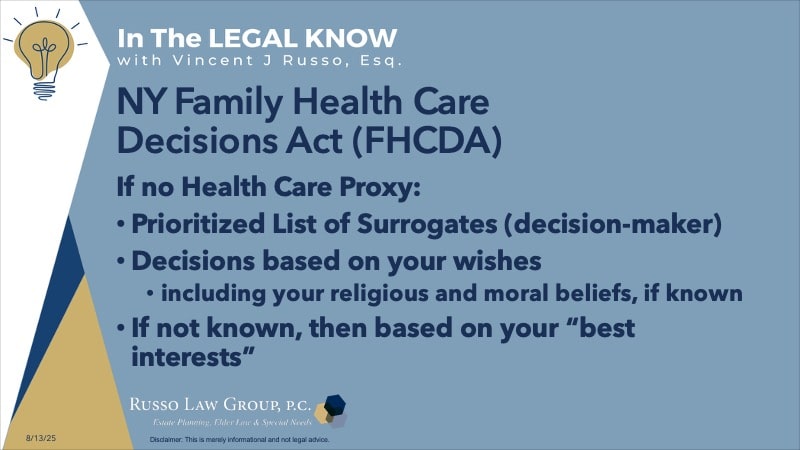Delve into the significance of resolutions, their origins, and actionable advice for making meaningful life improvements this year.
A Health Care Directive is a legal document that allows you to appoint someone you trust to make medical decisions on your behalf if you are unable to do so. This could be due to an accident, illness, or any situation where you’re incapacitated. It’s a way to ensure that your medical wishes are respected and that someone you trust is advocating for you when you can’t speak for yourself.
This originally aired on the Catholic Faith Network’s show CFN Live: https://youtu.be/BLIk4YDkFh8
What is a Health Care Directive is and why is it so important?

It can also be referred to as a healthcare power of attorney or durable power of attorney for healthcare. For example, in New York, we have the “Health Care Proxy” and the “Health Care Declaration”, typically referred to as a “Living Will”.
What is the purpose of a Health Care Directive and what are pros and cons of having one in place?
The main purpose of a Health Care Directive is to give you control over your medical care, even when you’re unable to communicate.
The pros are significant — it provides peace of mind for you and your loved ones, ensures your wishes are followed, and reduces the emotional burden on your family during a difficult time.
On the flip side, the only real con is that it requires some upfront planning and conversations, which can be uncomfortable for some people. But a little discomfort now can save a lot of heartache later.”
Are their formal requirements for a Health Care Directive like there is for a Will or Trust?
Yes, there is! The Health Care Directive must meet key requirements under State law.
It is important to follow the requirements of your state for a valid Health Care Directive.
For example, in New York you can only appoint one person (called the agent) to make health care decisions. As a practical matter, it is always good to have contingency planning in place such as a successor agent just in case your primary agent is not available.
There also will be execution requirements that must be followed. Here again, in New York, for example:
- You must have capacity
- The Proxy must be in writing
- Signature and Dating
- Witnesses – sign and date
- Notarization – not required
Tips for Selecting a Health Care Proxy
First, choose someone you trust completely — someone who understands your values and will advocate for your wishes, even in challenging situations.
It’s also important to have an open and honest conversation with them about your preferences for medical care. Be specific about your wishes, such as whether you’d want life-sustaining treatments in certain situations.
And don’t forget to share a copy of the document with your proxy, your doctor, and even close family members so everyone is on the same page. Communication is key.”
Are there different state laws and forms for Health Care Directives?
Each state has its own laws and specific forms for Health Care Directives. For example, in New York, we use a Health Care Proxy form, while other states might have something called an Advance Directive.
It is important to use the correct legal document for your state where you reside and to make sure it’s properly executed according to local laws. If you move to a new state, you may want to update your documents to comply with that state’s requirements.” Notwithstanding, a valid Health Care Directive executed in one state should be honored in another state.
What happens if you do not have a Health Care Directive and a medical decision needs to be made in a hospital?
If you do not have a health care directive, then your State may allow specific individuals to step in and make certain decisions for you.
For example, in New York, there is the Family Health Care Decisions Act (FHCDA) that outlines a prioritized list of individuals who can act as your surrogate (decision-maker). This list, in order of priority, includes: a court-appointed guardian, spouse or domestic partner, adult child, parent, adult sibling, or close friend. If no one on the list is available or willing, the medical facility may make decisions for you.
- Decisions must be made based on our wishes, including your religious and moral beliefs, if known.
- If your wishes are not reasonably known and cannot be ascertained, the surrogate will make decisions based on your “best interests”. This assessment considers factors such as preserving life, restoring health, relieving suffering, and your overall dignity and quality of life.
While the FHCDA provides a framework, it’s still best to have a Health Care Proxy to ensure your specific wishes are followed and to avoid any potential disagreements or delays in care.
Why should you create a Health Care Directive?
Creating a Health Care Directive is one of the most loving things you can do for your family. It removes the guesswork and ensures that your loved ones aren’t left making difficult decisions without knowing what you would have wanted. It’s a simple step that can make a world of difference during a very emotional time. And remember, it’s not just for older adults — anyone over the age of 18 should have one in place.”
Where can I find information or assistance with creating a Health Care Directive?
Depending upon your State, you can download a Health Care Directive Form with Instructions for free.
In New York, you can go to: www.health.ny.gov/publications/1430.pdf
If you would like to speak with an experienced elder law attorney regarding your situation or have questions about something you have read, please do not hesitate to contact our office at 1 (800) 680-1717. We look forward to the opportunity to work with you.
Disclaimer: The information provided above is for general informational purposes only and is not legal advice.







Comments (0)